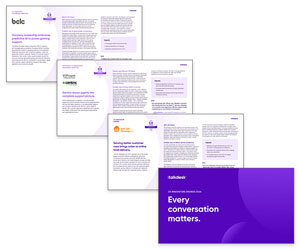Are your scripts switching off your customers?
Scripts can be an easy way to ensure agents say the right thing at the right time. But they could also be switching your customers off. If your scripts are guilty of any of the seven deadly sins below, it could be time for a rewrite.
1. Scripts can be too long
Avoiding long scripts within any part of the call is crucial to prevent switching your customers off. By the time the agent has efficiently completed the order or customer service piece of the call, the customer is primed for the up-sell. Effective scripts can guide your agents through the best up-sell offers for that customer.
At the same time, agents should keep the key product benefit statements at their fingertips. This allows the agent to appeal to the customer’s emotional need for the product, and helps them close on the up-sell at the highest order value available.
2. Trying to do too much with a script
Scripts are most useful at a tier 1 level where the support is less complex, and where you have the greatest opportunity to introduce new customers to your full range of products.

Leslie Hafer
Attempting to script more complex tier 2 and tier 3 level call types could be disastrous for the customer experience.
New hire agents handling these tier 1 level calls will benefit the most from the scripts and call flows as they learn to navigate the calls for the first time and fine tune their customer service and selling approach.
As agents become more experienced, we can allow some flexibility in their language and up-sell approach based on the needs of each customer, while at the same time following the call flows that we know work with our customers.
Rigorous piloting of new scripts with control groups, regular agent call monitoring and focus groups with your best agents will also lead to the most successful results from your scripts.
Leslie Hafer, Director, Program Management, Convergys
3. Scripts that are too obviously scripts

Sarah Hedayati
In order for employees to feel confident calling, they need scripts to act as a security blanket to either get the conversation rolling or handle a shift in the conversation they may have not expected.
A problem arises when a customer can spot the caller’s script. How do you avoid this situation? Offer your employees mini scripts and customer service training. Mini scripts give employees possible directions to take the call, but do not list an exact response. Exact responses are a sure giveaway that your employees have no idea what they’re talking about.
Training ensures your employees know how to take the conversation in the right direction. If your employees are not educated as to what customers are calling about or how to handle possible responses, you are out of luck.
Mini scripts and training are the way to turn your customers’ switch back on.
Sarah Hedayati, Customer Experience Professional, Impact Learning Systems
4. Failing to monitor the overall experience
Taking aside the debate about the degree of scripting being used, it is vital that the structure of calls is regularly reviewed.
Traditionally call structure has been reviewed from the perspective of average handle time (AHT) and call control. In our centre we consider this the “Plan B approach” – the adjustments we make to deliver better customer service when we are unexpectedly busy.

Paul Miller
This approach tries to trim the call to the essentials needed to reduce AHT overall while trying to maintain quality of customer experience. It may just replace some open questions with closed questions but it could be as radical as stripping out some pieces of non-essential data capture.
More interesting is the idea of a “Plan A+ approach” which tries to identify the key drivers for the customer and builds them into a perfect call guide to deliver better results. This approach has been in place in outbound sales for years because the structure of the call is easier to predict.
At the basic level we listen to customer feedback from customer satisfaction and agent feedback in focus groups and buzz sessions and constantly review the building blocks of calls, the order in which things are done, the way the queue is handled, the way transfers in and out are handled, the phrases which are used, and the opening and closing call branding.
Paul Miller, Associate Director – Contact Centres, Prolog
5. Sticking to scripts too rigidly

Siobhain Goodall
What makes someone more inclined to buy? Certainly being read a series of clumsy statements, without any conviction or emotion, doesn’t help. More likely a customer will buy if they gain some rapport with an operator.
Scripts should be renamed call guides. Secondly, let’s support our business needs with training and knowledge, and thirdly, let’s do this from the customer perspective, not the business perspective. Sure, in a bureau scripts are needed, not as a prescriptive dialogue, but as a guide and route to allow operators to perform their job, engage with the customer and get the job done.
Siobhain Goodall – Head of Business Development – Outsourcing, MPL Systems
6. Scripts that only hinder agents

Gemma Layton
In telemarketing, identifying with your customer and building a rapport with speed is vital in closing a sale. A script only hinders this and serves to make a customer feel unimportant, as if they’re just a number on a sales sheet. Opting for a more conversational sales pitch allows the agent to find out what makes the customer tick and so find the hook that will close the deal whilst making them feel that the product was made just for them!
Of course, it’s important that certain protocol is followed and that specific things (e.g. direct debit guarantees) are read to the caller verbatim. On these occasions, our agents tend to warn the caller that it’s coming up! At least then they know a robot is on its way!
Gemma Layton, Account Manager, RSVP
7. Not focusing on how the script is delivered

Andrea Haralambides
There should be more of a focus on how the agents are presenting that script, because in my experience you can have any script and make that work, I don’t think there is a specific type of script that people should stick to or that works in every situation.
It’s all about how you present it and how much attention and feedback your agents are getting. As far as I’m concerned, any script that I’m given, sales or outbound campaign, I’ll make it work in the way that I present it to the customer.
Andrea Haralambides, Training Manager, Call Britannia
How do you ensure your scripts don’t switch customers off? Share your thoughts in a comment below.
Author: Jo Robinson
Published On: 2nd Nov 2011 - Last modified: 23rd Jul 2024
Read more about - Hints and Tips, Call Scripting, CX, Empathy, Telesales, Training






















Our call center uses a script our company insist is “very successful”, yet those of us who must adhere to it find it cumbersome! I do wish we could be more natural in the way we speak to the customer and present the product. Customers are not dumb, and they know when we are using our own words, or reading a script- we need to respect their intelligence.